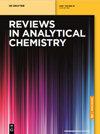Round robin tests of secondary raw materials: A systematic review of performance parameters
IF 3.8
3区 化学
Q2 CHEMISTRY, ANALYTICAL
引用次数: 1
Abstract
Abstract An improved management of secondary raw materials (SRM) is a crucial contribution for a circular economy and necessitates knowledge about the composition of wastes and SRM. However, this information is scarce and has to be determined with chemical analysis (CA). CA of SRM faces challenges, which can be approached by using round robin tests (RRT) to identify deviations from the “true value” of an element/molecule content. An RRT is a testing approach, which involves multiple labs to analyze one or more samples and evaluates the lab results with regard to the goal of the RRT. This article presents a systematic literature review and investigates which purposes and which performance parameters (PP) are commonly applied in RRT of SRM. The examined literature shows that the two main purposes applied are assessment of method performance and assessment of lab performance. PP can be categorized into trueness performance parameters (TPP; assessing the deviation of a value from a reference value) and precision performance parameters (PPP; describing the variability of a data set). The main TPP identified are z score and relative deviation, the main PPP identified are standard deviation and relative standard deviation. These results offer the conclusions that RRT can be used as a bespoke method to deal with analytical effects and that the selection of PP for an RRT could be based on simplicity.二次原料的循环试验:性能参数的系统回顾
改进对二次原料(SRM)的管理是循环经济的重要贡献,需要了解废物和SRM的组成。然而,这些信息是稀缺的,必须通过化学分析(CA)来确定。SRM的CA面临挑战,可以通过使用循环测试(RRT)来识别元素/分子含量与“真实值”的偏差。RRT是一种测试方法,它涉及多个实验室来分析一个或多个样本,并根据RRT的目标评估实验室结果。本文通过系统的文献综述,探讨了SRM的RRT中常用的目的和性能参数(PP)。经审查的文献显示,两个主要目的是评估方法绩效和评估实验室绩效。PP可分为真度性能参数(TPP;评估一个值与参考值的偏差)和精度性能参数(PPP;描述数据集的可变性)。TPP主要识别为z分和相对偏差,PPP主要识别为标准差和相对标准差。这些结果表明,RRT可以作为一种定制的方法来处理分析效应,并且RRT的PP选择可以基于简单性。
本文章由计算机程序翻译,如有差异,请以英文原文为准。
求助全文
约1分钟内获得全文
求助全文
来源期刊

Reviews in Analytical Chemistry
化学-分析化学
CiteScore
7.50
自引率
0.00%
发文量
15
审稿时长
>12 weeks
期刊介绍:
Reviews in Analytical Chemistry publishes authoritative reviews by leading experts in the dynamic field of chemical analysis. The subjects can encompass all branches of modern analytical chemistry such as spectroscopy, chromatography, mass spectrometry, electrochemistry and trace analysis and their applications to areas such as environmental control, pharmaceutical industry, automation and other relevant areas. Review articles bring the expert up to date in a concise manner and provide researchers an overview of new techniques and methods.
 求助内容:
求助内容: 应助结果提醒方式:
应助结果提醒方式:


